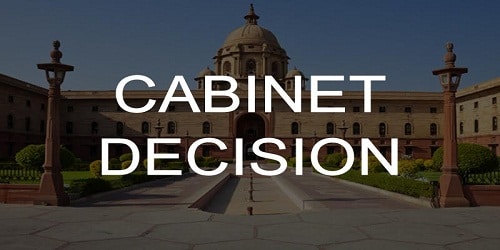The Union Cabinet chaired by the Prime Minister Shri Narendra Modi approved the following proposals on August 28, 2019:
 Approval to the amendments in The National Medical Commission Bill, 2019
Approval to the amendments in The National Medical Commission Bill, 2019
Approval was given to make changes in the National Medical Commission Bill, 2019.
i. Background: The original version of the Bill was approved by the Cabinet on July 17, 2019. It was passed in both Houses of Parliament on July 29, 2019 and August 1, 2019 respectively, with official amendments.
ii. Changes: The following changes have been made in the National Medical Commission Bill, 2019:
- Clause 4(1)(c) – 22 part-time Members instead of 14 members.
- Clause 4(4)(b) – 10 members instead of 6 members.
- Clause 4(4)(c) – 9 members instead of 5 members.
- Clause 37(2) – added at the end “for the purposes of teaching also”.
Approval for the proposal to Review the FDI policy on various sectors
Approval was given for the proposal to review the Foreign Direct Investment (FDI) policy on various sectors like Coal Mining, Contract Manufacturing, Single Brand Retail Trading (SBRT) and Digital Media.
i. Background: Government has put in place an investor friendly policy on FDI, under which FDI up to 100% is permitted on the automatic route in most sectors/ activities. FDI policy provisions have been progressively liberalized across various sectors in recent years to make India an attractive investment destination. Some of the sectors include Defence, Construction Development, Trading, Pharmaceuticals, Power Exchanges, Insurance, Pension, Other Financial Services, Asset Reconstruction Companies, Broadcasting and Civil Aviation. Total FDI in 2018-19 i.e. $64.37 billion (provisional figure) is the highest ever FDI received for any financial year. In Union Budget 2019-20, Finance Minister proposed to further consolidate the gains under FDI.
ii. Coal Mining:
- As per the present FDI policy, 100% FDI under automatic route is allowed for coal & lignite mining for captive consumption by power projects, iron & steel and cement units and other eligible activities permitted under and subject to applicable laws and regulations.
- Further, 100% FDI under automatic route is also permitted for setting up coal processing plants like washeries subject to the condition that the company shall not do coal mining and shall not sell washed coal or sized coal from its coal processing plants in the open market and shall supply the washed or sized coal to those parties who are supplying raw coal to coal processing plants for washing or sizing.
- It has been decided to permit 100% FDI under automatic route for sale of coal, for coal mining activities including associated processing infrastructure subject to the provisions of Coal Mines (special provisions) Act, 2015 and the Mines and Minerals (Development and regulation) Act, 1957 as amended from time to time, and other relevant acts on the subject. “Associated Processing Infrastructure” would include coal washery, crushing, coal handling, and separation (magnetic and non-magnetic).
iii. Contract Manufacturing:
- The extant FDI policy provides for 100% FDI under automatic route in manufacturing sector. There is no specific provision for Contract Manufacturing in the Policy. In order to provide clarity on contract manufacturing, it has been decided to allow 100% FDI under automatic route in contract manufacturing in India as well.
- Subject to the provisions of the FDI policy, foreign investment in ‘manufacturing’ sector is under automatic route. Manufacturing activities may be conducted either by the investee entity or through contract manufacturing in India under a legally tenable contract, whether on Principal to Principal or Principal to Agent basis.
iv. Single Brand Retail Trading (SBRT):
- The extant FDI Policy provides that 30% of the value of goods has to be procured from India if SBRT entity has FDI more than 51%. Further, as regards local sourcing requirement, the same can be met as an average during the first 5 years, and thereafter annually towards its India operations. With a view to provide greater flexibility and ease of operations to SBRT entities, it has been decided that all procurements made from India by the SBRT entity for that single brand shall be counted towards local sourcing, irrespective of whether the goods procured are sold in India or exported. Further, the current cap of considering exports for 5 years only is proposed to be removed, to give an impetus to exports.
- The extant Policy provides that as regards local sourcing requirement, incremental sourcing for global operations by the non-resident entities undertaking single brand retail trading, either directly or through their group companies, will also be counted towards local sourcing requirement for the first 5 years.
v. Digital Media:
The extant FDI policy provides for 49% FDI under approval route in Up-linking of ‘News & Current Affairs’ TV Channels. It has been decided to permit 26% FDI under government route for uploading/ streaming of News & Current Affairs through Digital Media, on the lines of print media.
vi. Benefits
The changes in FDI policy will result in making India a more attractive FDI destination, leading to benefits of increased investments, employment and growth.
Approval to Sugar export policy for evacuation of surplus stocks during sugar season 2019-20
Approval was given to sugar export policy for evacuation of surplus stocks during sugar season 2019-20 for providing a lump sum export subsidy at Rs. 10,448 per Metric Tonne (MT) to sugar mills for the sugar season 2019-20. The total estimated expenditure of about Rs.6,268 crore will be incurred for this purpose.
- The lump sum export subsidy will be provided for expenses on marketing costs including handling, upgrading and other processing costs, costs of international and internal transport and freight charges on export of up to 60 Lakh Metric Tonne (LMT) of sugar limited to Maximum Admissible Export Quantity (MAEQ) allocated to sugar mills for the sugar season 2019-20.
- The subsidy would be directly credited into farmers’ account on behalf of mills against cane price dues and subsequent balance, if any, would be credited to mill’s account. The subsidy shall be in conformity with the provisions of Article 9.1 (d) & (e) of Agreement on Agriculture (AoA) and thus WTO compatible.
- In wake of surplus sugar production during sugar season 2017-18(October – September) and sugar season 2018-19, notwithstanding various measures taken by the Government, the ensuing sugar season 2019-20 is expected to commence with an opening stock of about 142 LMT and season end stock are expected to be about 162 LMT.
Background: The surplus stock of 162 LMT of sugar would create downward pressure throughout the season on sugar prices affecting the liquidity of the sugar mills thereby leading to accumulation of cane price arrears of farmers. To deal with this situation, the Government has recently created buffer stock of 40 LMT of sugar for one year from 1st August, 2019. However, even after taking into account this buffer stocking of 40 LMT till 31st July, 2020 and likely diversion of sugar by way of production of ethanol from B-heavy molasses/cane juice during SS 2019-20 and requirement of normativestock for two months, there will be about 60 LMT of excess sugar stock that will need evacuation through export.
Approval to 75 new Medical Colleges
Approval was given for establishment of 75 additional Government Medical Colleges by 2021-22 attached with existing district/referral hospitals under Phase-III of the ongoing Centrally Sponsored scheme.
- To increase the availability of healthcare infrastructure and manpower, the Cabinet also sanctioned an expenditure of 24,375 crore during the 15lh Finance Commission period i.e. up to 2021-22.
- New medical colleges would be set up in under-served areas having no medical college; with at least 200 bedded District Hospital. Preference will be given to Aspirational Districts and District Hospital having 300 beds.
- The scheme on establishment of new medical colleges (58+24+75) would lead to addition of at least 15,700 MBBS (Bachelor of Medicine, Bachelor of Surgery) seats in India.
- The Government had earlier approved to establish 58 new Medical Colleges attached with existing district/referral hospitals under Phase-I and 24 under Phase-II. Of this, 39 medical colleges under Phase-I, have already started functioning, while the remaining 19 would be made functional by 2020-21. Under Phase-II, 18 new medical colleges have been approved.
Approval to the Establishment of an International Coalition for Disaster Resilient Infrastructure
Approval was given for the establishment of an International Coalition for Disaster Resilient Infrastructure (CDRI) along with its supporting Secretariat Office in New Delhi. The proposal was approved by the Prime Minister on 13th August, 2019. The CDRI is proposed to be launched at the United Nations (UN) Climate Action Summit in New York, USA on 23rd September 2019.
The approval is for the following initiatives:
- Establishment of the Secretariat of the CDRI as a Society under The Societies Registration Act,1860 in New Delhi as ‘CDRI Society’ or similar name as per availability. The memorandum of association and by-laws of the ‘CDRI Society’ will be prepared and finalized by the National Disaster Management Authority (NDMA), in due course;
- In-principle approval for Government of India support of 480 crore (approx. USD 70 million) to CDRI for a corpus required to fund technical assistance and research projects on an on-going basis, setting up the Secretariat office and covering recurring expenditures over a period of 5 years from 2019-20 to 2023-24;
- The endorsed version of the Charter document that will act as the founding document of the CDRI. The charter will be finalized after taking inputs from potential member countries by the NDMA in consultation with the Ministry of External Affairs.
Impact: It will benefit all sections of society and bring together technical expertise from a multitude of stakeholders. It will also benefit all areas with high disaster risk.
About Union Cabinet:
The Union Council of Ministers exercises executive authority in India. It consists of senior ministers called cabinet ministers, junior ministers called ministers of state and, rarely, deputy ministers. It is led by the Prime Minister.




